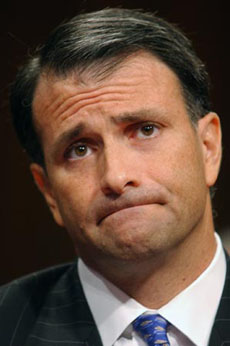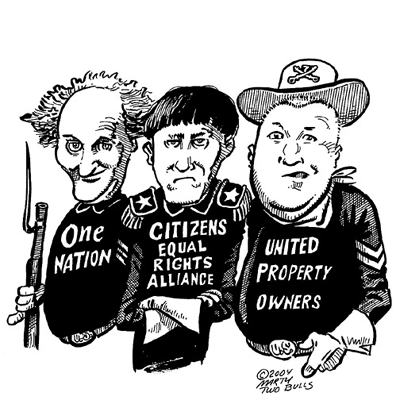 Another Stereotype of the Month entry:
Another Stereotype of the Month entry:
 Another Stereotype of the Month entry:
Another Stereotype of the Month entry:
Posted on Sun, Mar. 26, 2006
VIEWPOINT: Casino would be a bad bet
By Barb Lindsay and David Yeagley
THOUSAND OAKS, Calif. — Hats off to the members of the Evangelical Pastors Fellowship for their vision and courage in speaking out publicly about how gambling expansion would hurt Grand Forks.
We thought Herald readers would like to know about the experience of communities in other states where tribal casinos have opened.
We would like to believe Congress did not intend for non-Indian state governments, lobbyists, politicians and wealthy casino management companies to be the principal beneficiaries of the "economic opportunities" envisioned by the Indian Gaming Regulatory Act of 1988. Nevertheless, the $20 billion a year industry created by the act has left behind most of the people whom Congress did intend to help: the poverty-stricken Native American families across our nation.
Jack Abramoff is Exhibit A.
We would like to believe Congress remembers that citizens of the 50 states are Americans with the power to make and enforce laws. But Congress has given tribal sovereignty a primacy that has grown along with casino revenues even as the rights of U.S. citizens who are not enrolled members of a casino-owning Indian tribe have shrunk.
We would like to believe Congress did not intend "off-reservation" communities to be targeted as casino locations. But abuse of the law has opened the door to casino-tribe "reservation shopping" for prime gambling-facility venues.
That's why both Sen. John McCain, R-Ariz., and Rep. Richard Pombo, R-Calif., are sponsoring legislation to address this critical problem and now are holding hearings in Congress. And Rep. Mike Rogers, R-Ala., is sponsoring a bill that would place a moratorium on the construction of any new tribal casinos for two years' time, while this issue is studied by Congress. These bills deserve Grand Forks residents' active support.
We would like to believe Congress did not intend federal "trust" status of tribally purchased land should enable autonomous Indian gambling principalities to dominate the economy and social character of surrounding communities. But "sovereign immunity" shelters tribal trust land from taxation and virtually all state and local regulation, leaving it responsible only to Indian leaders and their out-of-state casino investors.
We would like to believe Congress did not intend tribal governments to make political contributions bankrolled with tax-exempt casino profits, without regard to contribution limits that apply to every other for-profit enterprise. But the Federal Election Commission has given a free pass to casino tribes and, indirectly, their non-Indian corporate backers to influence the policy decisions upon which the tribes' fast-growing casino monopoly depends.
The casinos also contribute to a highly addictive behavior that severely strains social services especially when tribal casinos let 18-year-olds gamble, as they do in many states such as Washington and California.
Sadly, the fact remains that the vast majority of tribal members across our nation currently are not seeing any real economic benefit from casino riches and abuses. In effect, they, together with the Americans whose communities have fallen prey to "reservation shopping," are the victims of a well-intentioned congressional act that has been superseded by the Law of Unintended Consequences.
We fervently hope that a majority vote in Congress will take place soon because comprehensive reform urgently is needed. We salute Grand Forks City Council members Dorette Kerian and Eliot Glassheim for speaking up on behalf of Grand Forks' future, especially for the sake of local young people. Their future is in residents' hands.
Lindsay is national director and spokesperson for One Nation United, a nonprofit group dedicated to the reform of flawed federal Indian policy. Yeagley, an enrolled member of the Comanche Nation of Lawton, Okla., is a musician, scholar and writer.

Rob's reply
>> We would like to believe Congress did not intend for non-Indian state governments, lobbyists, politicians and wealthy casino management companies to be the principal beneficiaries of the "economic opportunities" envisioned by the Indian Gaming Regulatory Act of 1988. <<
They aren't the principal beneficiaries. IGRA caps payments to non-Indian management companies at 30% of the total revenue.
States get anywhere from 5% to 25% of the revenue from gaming. This isn't something the tribes are giving away voluntarily. The states are coercing it from them as a prerequisite to conduct gaming.
Even so, consider the worst case. Suppose a tribe is paying the full 30% to an outside company (rare) and another 25% to the state it operates in (also rare). The tribe is still keeping 45% of the total, making it the largest beneficiary.
Payments to lobbyists and politicians are something like $10 million out of a $20 billion industry. That's 0.05% of the total. And those expenditures are legitimate government expenses that (are supposed to) benefit the tribe by securing its future.
>> Jack Abramoff is Exhibit A. <<
Huh? Jack Abramoff is Exhibit A for what? That tribes are paying too much to outside management companies? There's no connection between Abramoff and the payments to outside management companies. That tribes are paying too much to state governments? There's no connection between Abramoff and the coercive payments to state governments.
Abramoff is only "Exhibit A" that six tribes (out of 560-something) paid too much to one corrupt Republican lobbyist. See The Facts About Indian Gaming—Corruption to learn how the Abramoff scandal reveals nothing about the alleged corruption in the Indian gaming industry.
>> Congress has given tribal sovereignty a primacy that has grown along with casino revenues <<
The Supreme Court, not Congress, gave tribal sovereignty its "primacy" back in the 1820s. It's been the established law of the land ever since.
Here we see Yeagley, the Uncle Tom of Indians, arguing against the sovereignty that has given his people what little power they have. Can you say "sellout"?
>> We would like to believe Congress did not intend "off-reservation" communities to be targeted as casino locations. <<
The concept of off-reservation gaming is inherent in IGRA. You can believe what you want, but the fact that Congress passed the law and hasn't revoked or revised it in 18 years is telling.
>> But abuse of the law has opened the door to casino-tribe "reservation shopping" for prime gambling-facility venues. <<
There may be a lot of shopping going on, but no one's buying. That's because federal and state official can prevent an off-reservation casino from opening if they want to.
And so they've done in all but a handful of cases. In those cases, the people's representatives decided the off-rez casinos would be to everyone's benefit.
>> We would like to believe Congress did not intend federal "trust" status of tribally purchased land should enable autonomous Indian gambling principalities to dominate the economy and social character of surrounding communities. <<
They don't "dominate" the surrounding communities, so no problem there.
>> But "sovereign immunity" shelters tribal trust land from taxation and virtually all state and local regulation, leaving it responsible only to Indian leaders and their out-of-state casino investors. <<
Tribes must sign compacts with states before they can operate slot machines. These compacts specify what payments the tribes will make (= taxes) and what regulations they will follow. If the state and local governments don't like the deals they signed, they should negotiate better ones. It's not the tribes' fault if democratically elected politicians are bad negotiators. It's the people's fault for electing them.
Funny to hear Lindsay and Yeagley bemoan the lack of taxes on casinos when they also bemoan too much tribal income going to states rather than Indians. Can you say "contradiction"?
>> We would like to believe Congress did not intend tribal governments to make political contributions bankrolled with tax-exempt casino profits, without regard to contribution limits that apply to every other for-profit enterprise. <<
Tribal governments aren't for-profit enterprises any more than state lotteries are. Per IGRA, casino income goes to fund necessary tribal services such as health care and education.
Here's the law that applies to tribal campaign contributions. From Indianz.com:
FEC seeks to correct 'errors' about tribal donations
In the past couple of weeks, numerous reports have suggested that tribes are exploiting a "loophole" in federal law in order to make unlimited contributions to federal candidates and political action committees. But the FEC said tribes are playing by the same rules as everyone else.
Under the Federal Election Campaign Act, tribes can contribute up to $2,100 per election to federal candidates, $5,000 per year to PACs, $10,000 per year to the federal account of state parties and $26,700 to national parties, the advisory stated. But a tribe cannot make these contributions if it is classified as a corporation or a federal contractor, the same prohibition that applies to other corporations and contractors, the FEC said.
The law also establishes a $101,400 limit on contributions "individuals" can make in a two-year period. But since tribes are not considered "individuals," they are not subject to this restriction — and neither are certain entities such as political committees, according to the FEC.
"Indian tribes are treated in the same way as a number of other types of organizations, such as partnerships or certain limited liability companies, both of which are also not subject to the $101,400 limit imposed on individuals," the advisory stated.

Gambling is addictive...so banish Las Vegas?
>> The casinos also contribute to a highly addictive behavior <<
If so, that's true of the gaming industry as a whole—2/3 of which is non-Indian. Yet we don't see Lindsay and Yeagley denouncing casinos everywhere. No, they're opposed only to Indian casinos, which smacks of discrimination and prejudice.
It's also true of industries such as alcohol and tobacco. But again, we don't see Lindsay and Yeagley denouncing these addictive products. Why not?
>> Sadly, the fact remains that the vast majority of tribal members across our nation currently are not seeing any real economic benefit from casino riches and abuses. <<
So what? Congress didn't intend Indian gaming to benefit all tribes. It intended Indian gaming to benefit only those tribes that pursued it.
The lack of progress among tribes that don't conduct gaming is due to many factors. One of them is the federal government's refusal to fund the necessary services at the necessary levels.
>> In effect, they, together with the Americans whose communities have fallen prey to "reservation shopping," are the victims of a well-intentioned congressional act that has been superseded by the Law of Unintended Consequences. <<
About the only thing unexpected when Congress passed IGRA was how popular Indian casinos would be. Recent polls show that about 2/3 of Americans support Indian gaming.
>> Lindsay is national director and spokesperson for One Nation United, a nonprofit group dedicated to the reform of flawed federal Indian policy. Yeagley, an enrolled member of the Comanche Nation of Lawton, Okla., is a musician, scholar and writer. <<
We would like to believe this. Sadly, the truth is that One Nation United is racist organization dedicated to the destruction of Indian rights and sovereignty. And that Yeagley is an Indian apple who is betraying everything his people fought for.
I guess Yeagley teamed up with the far-right Lindsay because he has no credibility on his own. Unfortunately, she has no credibility either. This is a textbook case of the blind leading the blind.
Hate group or racist group?
More on One Nation United, Lindsay's group:
By Karen McCowan
The Register-Guard
Published: Sunday, August 27, 2006
Who and what is One Nation United?
That depends on whom you ask.
At a recent Douglas County Commission meeting, ONU Executive Director Barb Lindsay described the group as a "nonprofit, nonpartisan public educational umbrella group" formed to "defend private property rights, free enterprise and the rule of law." It formed in late 2004 with the merger of two groups: Oklahoma-based One Nation Inc. and Washington-based United Property Owners.
Lindsay, of Redmond, Wash., also said the group is working to "reform federal Indian policy," saying that "the scales of justice have become unbalanced."
Opponents of the group, including Indian tribes in New York, Oklahoma and Oregon, say it is a racist front group for industries that compete with tribally owned businesses in those states, such as the Oklahoma Petroleum Marketers' Association.
ONU began commanding attention in Oregon when Douglas County Commissioner Marilyn Kittelman joined its campaign for caps on tribal land trusts. And Kittelman's recall campaign manager, Douglas County Planning Commissioner David Jaques, recently became ONU's president.
Jaques acknowledged that ONU is lobbying Congress to cap tribal land trusts.
"But these spurious charges that this is some kind of hate or racist group? That's insane, like saying the National Federal of Business is a hate group," he said.
Every page of ONU's August 2006 newsletter contains stories about what it calls "misguided" federal Indian policy. One article, for example, says:
"The tribes' `separate-but-favored' status has protected individual tribal members from the predations to which they, historically, were victim. But the Indian Gaming Regulatory Act transformed that shield into a sword that has been thrust into established, non-tribal communities whose citizens are left defenseless."
Sue Shaffer, chairman of the Cow Creek Band of the Tribes of the Lower Umpqua, called ONU a "national hate group" that has tried to stir up resentment here over the Cow Creeks' legal removal of about 2,000 acres from county tax rolls.
"What really, really hurts me is the lies about what we've done," she said.

Lindsay said, for example, that property taxes would go up for other Douglas County residents if the tribe removes land from the tax rolls. But state property tax limitations prevent that. And the tribe has contracts with and makes donations to the local taxing district that far exceed any lost property tax receipts, said Michael Rondeau, its financial officer.
Jaques said he aligned with ONU after he was criticized by Cow Creek leaders for remarks he made to a Florence anti-casino group about the negative effects of such tribal operations.
"Ever since that day, I have been persona non grata with the Cow Creeks, who are on an absolute mission to defame me and harass me," he said. "I recognize their right to have sovereign government, but I have grave concerns about them taking land off the tax rolls, which reduces our sovereign nation."
Jaques is a Winston real estate agent with a long political r<142>sum<142>. His paid campaign posts have included directing the Southern Oregon field offices of President George W. Bush and Republican gubernatorial candidate Kevin Mannix, and handling communications for Oregonians in Action. That group successfully pushed for passage of Measure 37, which requires government to pay compensation if its actions devalue an owner's property.
Jaques was himself a candidate in 2004, when he unsuccessfully challenged Douglas County Clerk Barbara Nielsen.
Lindsay said ONU has more than 300,000 members nationwide. Critics say it exaggerates its populist appeal by counting as individual members everyone who belongs to organizational members, such as the Oklahoma Farm Bureau.
Jaques acknowledged Friday that the 300,000 "may be an amalgamated figure of all the groups we represent."
Related links
The facts about Indian gaming
The facts about tribal sovereignty
|
. . . |

|
All material © copyright its original owners, except where noted.
Original text and pictures © copyright 2007 by Robert Schmidt.
Copyrighted material is posted under the Fair Use provision of the Copyright Act,
which allows copying for nonprofit educational uses including criticism and commentary.
Comments sent to the publisher become the property of Blue Corn Comics
and may be used in other postings without permission.